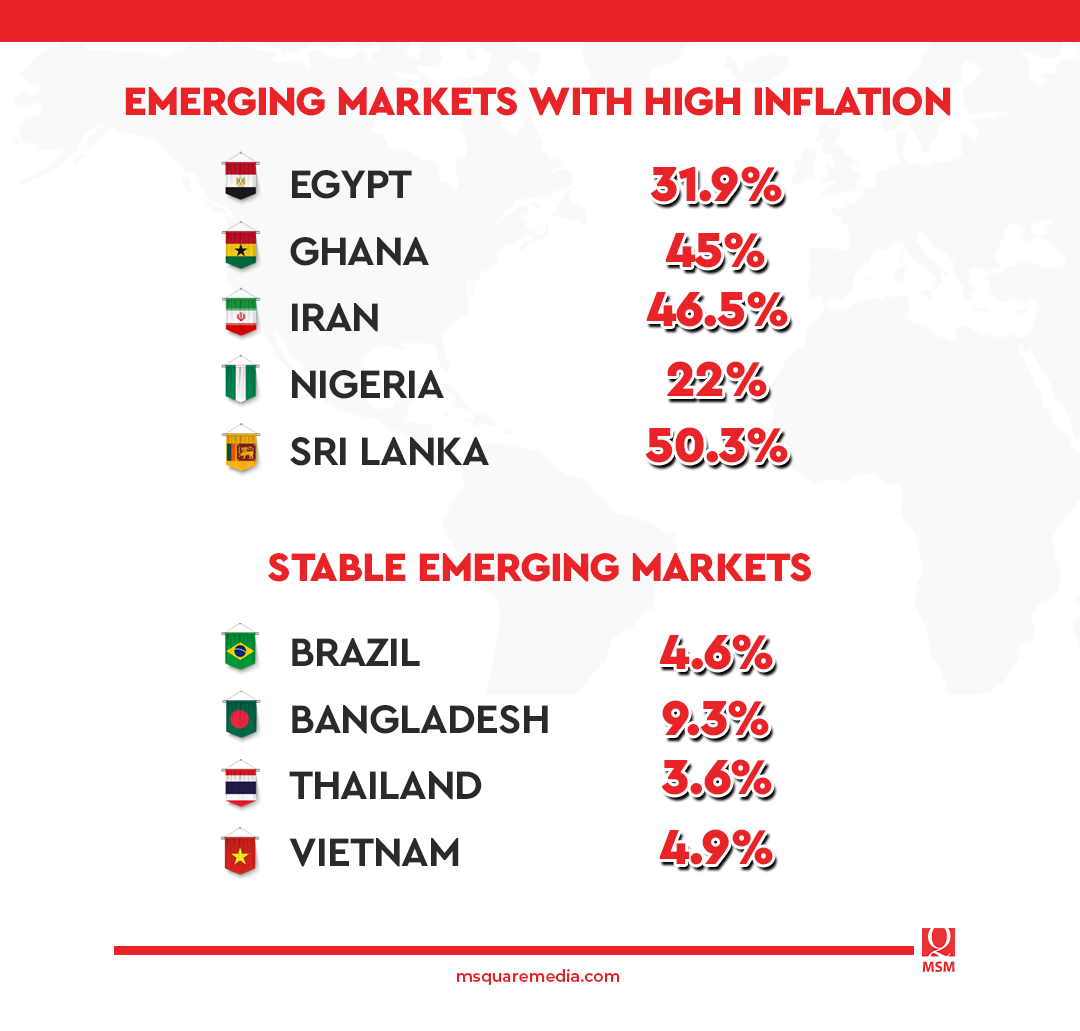Key Takeaways:
- High inflation rates raise the cost of tuition and living expenses for students and make it difficult for families to save for education.
- Several emerging markets, including Egypt, Ghana, Iran, Nigeria, Turkey, and Sri Lanka, are confronted with significant inflationary challenges, which influence the affordability of studying abroad for students and their families.
- Brazil and Mexico exhibit stability relative to other emergent markets, with Brazil’s economic performance anticipated to outpace its peers and Mexico’s early intervention reducing inflation.
The global economy faces many challenges, including a rise in inflation and a decline in foreign exchange rates. These factors have a significant impact on the cost of studying abroad, making it more challenging for students from several countries to pursue international education.
When inflation is excessive, it means that individuals must spend more money to acquire the same goods. This can make it difficult for families to save money for their children’s education, and it can also increase the cost of tuition, housing, and other expenses for students.
And when a currency weakens, it requires more units of that currency to purchase one unit of another currency. This can make it more expensive for students from countries with weak currencies to study abroad, as they will have to exchange more of their home currency for the foreign currency needed to pay tuition and other expenses.
In recent years, the demand for studying abroad has increased, with Canada, the United Kingdom, Germany, and France enrolling a record number of international students. However, the financial strains faced by many households in emerging markets pose a threat to this growth trajectory. In some of the key markets for the recruitment of international students, inflation and devalued domestic currencies present significant challenges for students and their families.
Examining destination countries reveals that inflation rates varied considerably. Australia’s inflation rate fell from a 30-year high in Q4 2022 to 7% in Q1 2023, while Canada’s inflation rate in March 2023 was the lowest since August 2021. France’s inflation rate fell to its lowest level in six months, 5.3%, while Germany’s inflation rate fell from over 8% in February and March 2023 to 7.4%. In February 2023, the inflation rate in the United Kingdom decreased from 9.1% to 8.9%, and the inflation rate in the United States reached its lowest level since May 2021, at 6.4%. However, rising food prices in the United States and Canada, as well as food prices and energy costs in Europe, have been an issue for at least a year, affecting the cost of living for international students and causing families of prospective students to reconsider certain study abroad destinations.

Inflation Challenges in Emerging Student-Sending Markets
Egypt, Ghana, Iran, Nigeria, Turkey, and Sri Lanka are among the nations facing serious inflationary issues. In Egypt, where 47,243 students studied abroad in 2022, according to UNESCO data, inflation reached 31.9% in March 2023 due to rising food prices and currency devaluation. In response, the Egyptian government has increased interest rates, but some have criticized this as insufficient to address the underlying causes of inflation.
In Ghana, where an estimated 18,214 Ghanaian students are pursuing higher education abroad in 2020, inflation, with a rate of 45% in March 2023, is also an issue of concern. According to the World Bank, increased costs of living, such as rising electricity and water prices, have impacted household budgets by driving up food prices. In 2022, poverty reduction has declined, and Ghanaian households are under pressure from inflation. Nonetheless, the Economist Intelligence Unit anticipates a return to growth in the future, driven by an increase in gold and oil exports.
In 2022, Canada attracted 21,115 Iranian students (an increase of 25% from the previous year), while Germany and the United States attracted 11,625 and 9,295 Iranian students, respectively. However, Iran’s inflation rates are spiraling out of control, reaching a record high of 46.5% in March 2023. It is anticipated that hyperinflation will persist through 2023, eroding the value of the local currency, the rial, and exponentially increasing the cost of products. Families in Iran must cope with a depreciating currency and soaring food prices, especially for staples such as meat and dairy.
The most recent statistics from UNESCO indicate that 75,753 Nigerian students are studying abroad. However, the country also saw an increase in inflation to 22% and a 24.45% increase in food inflation, which were both exacerbated by currency redesign and devaluation. Turkey experienced an inflation rate of 55.2%, while Sri Lanka struggled with an inflation rate of 50.3%, both nations experiencing economic difficulties exacerbated by natural disasters and structural problems.
Stability in Emerging Markets
Inflation in Brazil fell to its lowest level since January 2021 in March 2023, when it reached 4.6%. Due to the reopening of China’s economy and increased soybean production, GlobalData.com predicts that the country’s economic performance will exceed that of its Latin American counterparts. Brazil, the world’s largest producer of soybeans, anticipates an increase in soybean exports in 2023 as a result of the use of soybeans for edible oils in response to supply shortages brought about by the Russia-Ukraine conflict.
Meanwhile, the Organization for Economic Co-operation and Development (OCDE) has praised Mexico for its early and astute intervention to control inflation. Even though the Mexican economy is expected to grow marginally in 2023, its stability relative to other emerging markets is viewed favorably. If the United States avoids recession, Mexico will likely maintain its stability.
In 2023, Bangladesh will encounter challenges, particularly concerning inflation. Inflation reached 9.3% in March 2023, the highest level since August 2022. To maintain its development momentum, the World Bank emphasizes the significance of implementing prudent policies and prioritizing efforts to curb inflation, which is primarily driven by rising food prices.
Meanwhile, Thailand’s economic growth is projected to increase to 3.6% in 2023, up from 2.6% in 2022. This expansion is attributable to increased consumer demand, a tourism industry revival, and China’s reopening. With an inflation rate of 2.8% in March 2023, Thailand’s economy is poised for growth.
Lastly, Vietnam’s economy rebounded significantly in 2022, surpassing its average growth rates from 2016 to 2019. The March 2023 rate of inflation was 4.9%, indicating a stable economic environment. The World Bank’s optimistic assessment points to Vietnam’s adaptability and growth potential.
Moving Forward
The increasing cost of living is having a major effect on the availability of international study opportunities for students. And without a doubt, there are many solutions to the problem of inflation and currency fluctuations affecting international students.
Students who choose to study abroad may receive financial aid from their respective governments. Scholarships and other forms of financial aid are available from several schools for international students. In addition, companies can help international students get job experience by offering internships and other opportunities during their time abroad.
If we take these measures, we can ease the way for students from all over the world to participate in studying abroad. Students, schools, and nations will all reap the rewards of this. (SUNEETHA QURESHI)

SUNEETHA QURESHI
MSM President
Suneetha has worked for 15 years in the international education sector and 25 years overall for her work for other industries. As president of MSM, she fortifies its business development outreach globally, particularly in the face of MSM’s foray into edtech-based recruitment via MSM Unify. She preserves the premium, value-adding services provided to each MSM partner institute, including dedicated teams on the ground, agent management, lead generation and inquiry management, application prescreening, and student and parent support through pioneering pre-departure briefing sessions.
She has an impeccable track record of successfully launching the representative offices in Asia and Africa of many North American and European higher education institutions. Her key strengths include hiring, training, and developing teams as evidenced by the successful results of the dedicated in-country college and university client teams.
Suneetha also has taken the lead in developing several initiatives at MSM, including building robust standard operating procedures, the Rise ‘n Shine team engagement platform, and the organization’s data analytics and audit segments.
Sources:
- 2023. The cost of living: A closer look at inflation and foreign exchange trends in key student markets. Icef Monitor. Retrieved from https://monitor.icef.com/2023/04/the-cost-of-living-a-closer-look-at-inflation-and-foreign-exchange-trends-in-key-student-markets/
- Refik, F. 2023. Education Exodus: Does Studying Abroad Really Guarantee a Better Future for Egypt’s Youth?. Egyptian Streets. Retrieved from https://egyptianstreets.com/2023/03/05/education-exodus-does-studying-abroad-really-guarantee-a-better-future-for-egypts-youth/#:~:text=Recent%20UNESCO%20figures%20insinuate%20that,as%20to%20why%2C%20are%20many.
- 2023. Number of Ghanaian students in tertiary education abroad from 2010 to 2020. Statista. Retrieved from https://www.statista.com/statistics/1185192/ghanaian-students-in-tertiary-education-abroad/#:~:text=The%20number%20of%20 Ghanaian%20 students,the%20highest%20value%20since%202010.
- 2023. Nigeria Education and Training Services Industry Snapshot. International Trade Administration U.S. Department of Commerce. Retrieved from https://www.trade.gov/country-commercial-guides/nigeria-education-and-training-services-industry-snapshot#:~:text=Population%3A%20225.1%20 million%20(2022%20est.)&text=Nigeria%20has%2071%2C753%20students%20studying%20abroad%20according%20to%20UNESCO.
